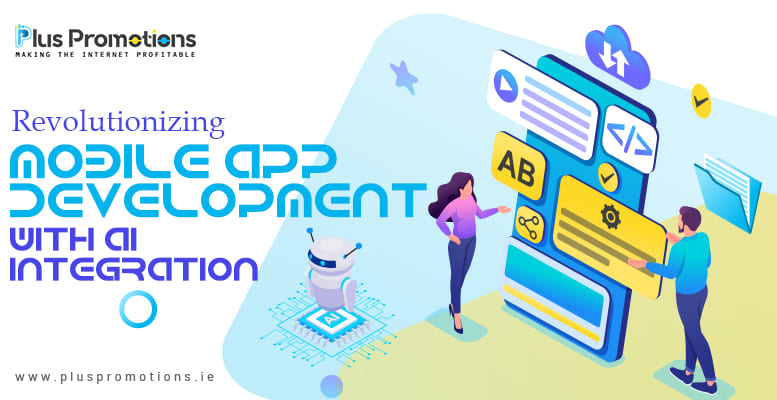0212061864 [Phone] | +353 (87) 419 5190 [Mobile]
0212061864 [Phone] | +353 (87) 419 5190 [Mobile]

The mobile app development industry has consistently benefited from AI, catalyzing competitiveness and growth. The global artificial intelligence software market has experienced impressive growth, and projections indicate that this growth will escalate further. This is why business owners are enthusiastic about implementing artificial intelligence into mobile app development. This blog is for those interested in learning about AI for app development.
Artificial intelligence is a simulated version of human intellect that thinks and acts like humans. AI researchers say that it allows machines to perceive their surroundings and take actions to enhance their chances of accomplishing objectives. AI has long been employed in computer programs. However, it is now employed in a wide range of services and products, particularly in mobile application development.
For those seeking innovation and creativity in their mobile apps, AI emerges as a pivotal player in the app development landscape. AI technology in mobile applications enables machines to understand and respond to inputs, thereby improving the user experience.
The primary purpose of integrating AI into mobile apps is to address everyday challenges encountered by users and enhance their quality of life. AI has the ability to collect critical data from mobile devices, such as location, contacts, and everyday activities, enabling greater user involvement and the resolution of complex challenges.
By analysing user behaviour and interaction with the app, AI-enabled apps can collect and retain data. This capacity enables the development of AI-powered mobile apps that alter and alleviate human needs.
AI can also be used to improve the efficiency and accessibility of AR applications. For example, when creating an AR app, AI can be used to improve real-time object and image recognition. This integration empowers the creation of more intelligent, responsive, and innovative applications in the AR domain.
Key Roles of AI in Development Include:You're well aware of AI's significance in mobile app development. However, as an entrepreneur, you must understand why developing AI-powered software is so important for your firm. Let's have a look at it in the next part.
We've addressed this question to help you understand how integrating AI in business can provide you with a competitive advantage in the market.
AI, particularly robotic process automation (RPA), empowers businesses to automate routine digital and physical tasks, from back-office operations to data entry and financial processes.
AI technology uses advanced algorithms to detect patterns in massive datasets and extract valuable insights to improve the quality of service. When you integrate machine learning applications into your business, you can:
By using machine learning platforms, you can develop data-intensive, detail-oriented machine learning applications. These apps have the capability to make predictions based on new data, ultimately elevating service quality and positioning your business for a competitive advantage in the market.
AI has transformed the way organisations communicate with their staff and customers by deploying cutting-edge technologies. These innovations include natural language processing chatbots, intelligent agents, and machine learning solutions.
Intelligent agents have emerged as a game-changer, ensuring round-the-clock availability to tackle an array of issues, ranging from simple data updates to addressing complex technical support queries. They have found utility in diverse domains, including:
Artificial Intelligence (AI)-powered tools excel at providing optimal solutions for intricate user problems. These applications are born out of the need to address multifaceted issues faced by numerous customers. AI stands as a pivotal technology, delivering proactive and responsive solutions to complex challenges.
AI's impact extends far and wide, leaving an indelible mark on both everyday life and business operations. It continually enhances the functionality of applications, offering tremendous benefits. So, it can’t be a bad idea to invest in AI-integrated apps for your business.